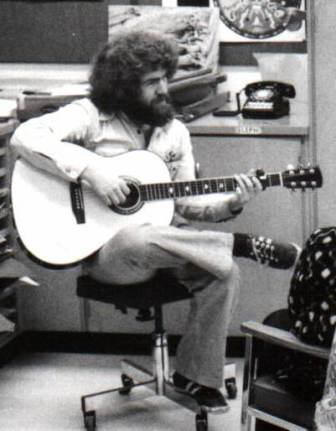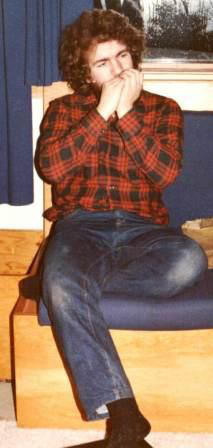


EARLY YEARS BALLADEER AND STORYTELLER SONGS VIDEOS
My father, on the drums, playing briefly in a band with his brother Don. A few years later, he learned to play piano accordion. In his teens, he picked up the guitar. He eventually became a fine balladeer and storyteller, fondly remembered by many.
EARLY HISTORY
My father, Stewart Cameron, was born in Scotland in 1947. His parents, Duncan (a native of Scotland) and Muriel (originally from Halifax, Canada) moved to Canada a year later. My father grew up in Ajax, Ontario.

 He began showing an artistic streak at an early age. He was
known amongst peers and family members as a talented artist. He was
invited to paint a mural in the local hospital with his fellow high school
students. When he expressed a desire to try his hand as a musician, my
grandparents supported him by paying for piano accordion lessons. In his
teens, he began making a stab at songwriting, very much in the style of Bob
Dylan. He taught himself how to play the guitar and wrote songs that
reflected the feelings of youths in the 60s.
He began showing an artistic streak at an early age. He was
known amongst peers and family members as a talented artist. He was
invited to paint a mural in the local hospital with his fellow high school
students. When he expressed a desire to try his hand as a musician, my
grandparents supported him by paying for piano accordion lessons. In his
teens, he began making a stab at songwriting, very much in the style of Bob
Dylan. He taught himself how to play the guitar and wrote songs that
reflected the feelings of youths in the 60s.
Later, he attended University of Toronto studying Fine Arts. As a young man, he produced several paintings, many of which I remember seeing on the walls of our house as I was growing up. But as a young married man and new father, he couldn't depend on making money as a painter. He found work instead as a graphic artist for Sick Children's Hospital in Toronto.
BALLAD
SINGING AND STORYTELLING
He became involved in singing traditional Scottish music, reaching back to the culture of his birth. He sought out esteemed Scottish balladeers Ewan MacColl and A. L. Lloyd as primary sources for most of his repertoire. He performed at a few clubs in Toronto, singing solo or in duets with Margaret Chrystl. Soon, he was introduced to the up and coming folk sensation - The Friends of Fiddlers Green.
My father performed with the Friends of Fiddler's Green for the better part of a decade. With them, he traveled to festivals and clubs across Canada and the US. At the same time, he developed a reputation as a notable ballad singer, even winning the admiration of Canada's distinguished folklorist, Edith Fowke. Here are a smattering of photos of the Friends from the 70s to early 80s.
 It was during this period he began dabbling in the art of
storytelling. I recall being told (not read) stories as a small child, but
for many years, my father never considered telling them professionally.
After meeting
Dan Yashinsky, one of the founders of the Toronto School of Storytelling, my
father participated regularly at the 1001 Friday Nights of Storytelling club, as
well as the annual Toronto Storytelling Festival.
It was during this period he began dabbling in the art of
storytelling. I recall being told (not read) stories as a small child, but
for many years, my father never considered telling them professionally.
After meeting
Dan Yashinsky, one of the founders of the Toronto School of Storytelling, my
father participated regularly at the 1001 Friday Nights of Storytelling club, as
well as the annual Toronto Storytelling Festival.
In the mid-80s, my family moved to Sudbury, Ontario. My father immediately began making a name for himself in the region. He performed throughout Northern Ontario as a children's entertainer, a storyteller, and as a member of my family's performing mummer's troupe - Mums the Word. He got involved as an organizer of folk events, starting monthly House Ceilidhs (song circles), hosting house concerts for notable performers like Paddy Tutty and Roy Bailey, and even producing a regular TV show on the local cable channel to promote other local entertainers of all genres. And of course, he helped out as an artistic director for the Sudbury folk festival, Northern Lights Festival Boreal.
In August of 1988, my father performed for the last time at the Sudbury Summer Celtic Festival. He had been diagnosed with cancer earlier that summer. He died in June of 1989, just shy of receiving Festival Boreal's first "Jackie Washington Award". My mother received the award in his name.
My father, sadly, never made a recording. His music only remains as a memory kept alive by both my brother, Duncan, and me.
SONGS: My father sang a variety of ballads and folk songs, from England, Ireland, Scotland, Canada, and the United States. He also sang his own compositions (although he rarely performed them) and those of other esteemed singer-songwriters. Below are the lyrics of two samples of this diverse repertoire.
My father wrote this before he graduated high school. The first person he sang it to was my grandmother. He told me later that when she first heard it, she cried. He called it 'Dialogue in A' because that's the key he played it in. He rarely performed this or any of the songs he penned himself.
This was a favourite of my grandfather's. My father sang it often. After we moved to Sudbury, I picked up a harmony and began singing this ballad in a duet with my father. To honour his memory, I recorded this song on my second album
Child Ballad # 293 Question:
Response:
Question:
Response:
Question:
Response:
I wish I could come with you when you go.
You know like you I love the wind and snow.
Your road can’t be so long, that I can’t tag along.
There’s hills and mountains that I haven’t climbed.
I wish that I could say I want you by me
And taste the comfort of your standing near.
But that would be a lie; my highway is the sky
And none but me can climb as high or near.
But won’t you miss the empty silence singing
While we were waiting for the strings of dawn?
The night I kept you warm in the circle of my arms;
Oh won’t you miss me when you’ve gone away?
The answers to your questions they lie hidden.
The beauty of your love is what I fear.
You know I’ll go my way whatever you might say.
But still you think your time and place is here.
But won’t you miss the times we’ve had together?
Oh won’t you miss the laughter and the tears?
Your own true love’s caress? The words we left unsaid?
Oh won’t you miss the love that we have shared?
I’m sure I’ll miss some of the things you mention.
But I can’t linger in the warmth of you.
There’s things I want to see, and things I’ve gotta be,
And there’s nothing in your love can hold me now.
"Why weep ye at the tide, lady, why weep ye at the tide?
I'll wed ye tae my eldest son and ye shall be his bride.
And ye shall be his bride, lady; sae comely to be seen."
Ah but aye, she loot, the tears doon fa' for Jock o' Hazeldean.
"Oh let this willful grief be done; dry up your cheeks sae pale.
For Frank is chief o' Erlington and he's Lord o' Langlydale.
His foot is first in peaceful ha'; but his sword in battle keen;"
Ah but aye, she loot, the tears doon fa' for Jock o' Hazeldean.
"A coat of gold ye shall not lack, nor caemb to bind yer hair;
Nor mettled hound, nor managed hawk; nor palfrey fresh and fair.
And ye the foremost o' them a', shall ride the forest queen."
Ah but aye, she loot, the tears doon fa' for Jock o' Hazeldean.
The kirk was decked a' morningtide; the tapers glimmered fair.
The priest & bridegroom wait the bride, & lord and knight were there.
They sought her baith in bower and ha', but the lady was not seen
For she's o'er the border and awa' wi' Jock o' Hazeldean.
VIDEOS: My brother, Duncan, has uploaded several clips from Cable television show my father did while we lived in Sudbury, Ontario, to YouTube. Because the original tapes were in such bad shape, some of the videos have poor picture quality, but they still are a wonderful archive of how my father's skill at weaving stories both in story and song. Here are a few links, but to see more, visit Stewart Cameron YouTube Videos:
| Traditional Songs & Ballads | Contemporary Folk Songs | Storytelling & stories |
|
Peggy Seeger's 'I'm gonna be an Engineer' |
ö Moira's Home Page ö Albums ö Photo Gallery ö
To contact Moira, email
admin@celtarctic.comor write
Moira Cameron, 4505 Schooldraw Ave, Yellowknife, NT, X1A 2K3, Canada
This page has been updated June 29, 2016











